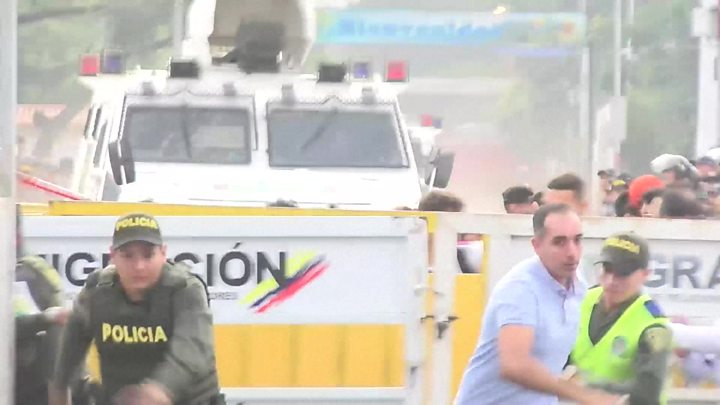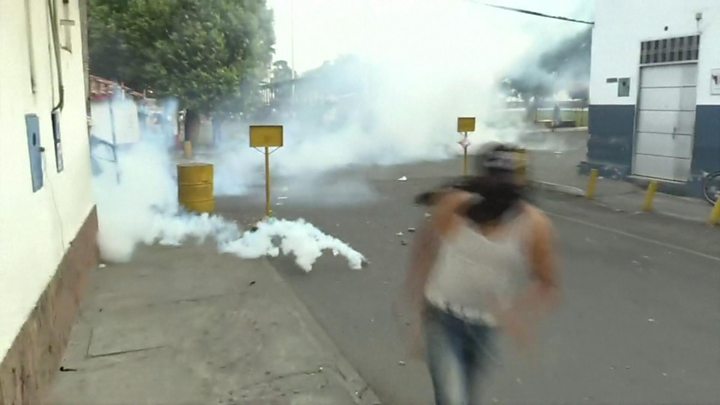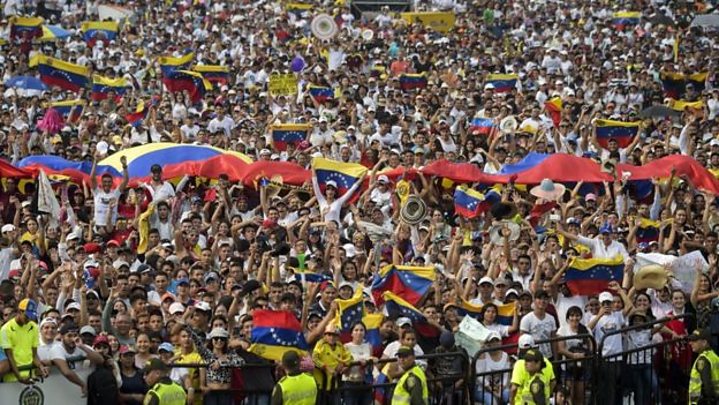Venezuelan troops abandon posts amid violent clashes with
protesters at Colombian border
At
least five Venezuelan troops have abandoned their posts at the country's
border with Colombia as confrontations with protesters over incoming
humanitarian aid grow more violent by the day.
The
soldiers abandoned their watch on Saturday near the Simon Bolivar
International Bridge at the Venezuela-Colombian border and reportedly requested
assistance from Colombian immigration officials. In nearby Urena, the
Venezuelan National Guard fired tear gas and rubber bullets at protesters attempting
to cross the border in order to work, BBC reports. Protesters were seen
throwing rocks at troops and attacking buses.
At the
country's other border in Brazil, four people have been killed as of Friday,
and an additional 18 have been injured by colectivos -- armed gang members
who support President Nicolas Maduro, according to Alfredo Romero, the director
and president of the Venezuelan human rights association Foro Penal.
Demonstrators
push a bus that was torched during clashes with the Bolivarian National Guard
in Urena, Venezuela (AP Photo/Rodrigo Abd)
ANDY
PUZDER: AS VENEZUELA IS DEVASTATED BY MADURO, TRUMP IS FORCEFULLY CONFRONTING
THE EVILS OF SOCIALISM
Rising
tensions have erupted amid opposition leader and self-declared President
Juan Guaido's decision to lead a caravan with thousands of volunteers to
the Colombian border to collect at least 200 tons of humanitarian aid,
primarily food and medicine. On Saturday, Guaido announced that the first
shipment of aid had crossed the border from Brazil, calling it a "great
achievement." That statement, however, has been refuted by news that two
trucks carrying aid from Brazil are stuck at the Venezuelan border.
Guaido
rose to power last month, arguing that Nicolas Maduro's re-election in May 2018
was invalid and marred by vote-rigging.
On
Thursday, Maduro announced that he planned to close Venezuela's border with
Brazil "totally and completely" to stop the import of humanitarian
aid from foreign countries, namely the United States. On Saturday, he announced
that all the country's borders would be closing, and severed diplomatic
relations with Colombia.
Maduro
argued that foreign aid was an attempt by the United States to undermine
his authority. The United States has vocalized support for Maduro's opposition,
while Maduro has received support from countries such as Russia, Cuba and
China.
"What
the U.S. empire is doing with its puppets is an internal provocation,"
Maduro said on Thursday. "They wanted to generate a great national
commotion, but they didn't achieve it."
Through
his Twitter account on Saturday, Maduro emboldened Venezuelans to
"mobilize."
Venezuelan
Bolivarian National Guards lineup to block the main entrance of Simon Bolivar
bridge to Brazil (AP Photo/Fernando Llano)
FLORIDA
DEMS FUME AT BERNIE SANDERS FOR REFUSING TO CONDEMN MADURO AS DICTATOR
"Let's
all take to the streets to defend our independence with conscience and
joy," he wrote.
Venezuelans
in support of Maduro heeded his request, and began to congregate by the
thousands in the country's capital of Caracas to show their support, as his
opposition congregates at border crossings.
The
decision for Venezuelan troops to abandon their posts at the Colombian border
illustrates the conflict posed by pressures from opposing political forces in a
time of great economic strife for the Venezuelan people. The United Nations
announced in August that more than three million migrants and refugees
left Venezuela because of its lack of food and medications.
A
demonstrator throws rocks during clashes with the Bolivarian National Guard in
Urena, Venezuela, near the border with Colombia, Saturday, Feb. 23, 2019 (AP
Photo/Rodrigo Abd)
"I've
spent days thinking about this," said one of the soldiers who left his post.
The man, whose identity was not revealed, called on other soldiers to join
him in abandoning their support for Maduro's socialist government.
CLICK
HERE TO GET THE FOX NEWS APP
"There
is a lot of discontent inside the forces, but also lots of fear," he
added.
Venezuela soldiers abandon posts at Colombia
border

Media
playback is unsupported on your device
Media captionThe moment Venezuelan troops crashed through border
into Colombia
In a
separate development, Venezuelan troops have fired tear gas at people looking
to cross into Colombia to work.
Tensions
have been rising over a row about the delivery of humanitarian aid.
President
Nicolás Maduro said the border with Colombia is partly closed to stop aid being
delivered.
But
self-declared interim president Juan Guaidó has vowed that hundreds of
thousands of volunteers will help bring in the aid deliveries, which include
food and medicine, on Saturday.
The
first delivery of aid has already entered Venezuela through Brazil, Mr Guaidó
tweeted.
The
delivery of aid to the stricken country has proven to be a key area of
contention between the two men who see themselves as Venezuela's leader.
What's the latest? Image copyright Reuters Image caption A
demonstrator runs into barbed wire strung across a street in Ureña
Pictures
at various crossing points show security forces firing tear gas at volunteers
and protesters burning outposts and throwing rocks at soldiers and riot police.
On the
Venezuela-Colombia border, at least thirteen members of the security forces
defected on Saturday, Colombia's migration authority said.
A video
posted on social media appears to show four soldiers publicly denouncing Mr
Maduro and announcing their support for Guaidó.
"We
are fathers and sons, we have had enough of so much uncertainty and
injustice," they say.
Local
media report people jumping the barricades to cross the border, while
opposition MPs have posted defiant messages on social media denouncing the use
of force.
The
BBC's Orla Guerin, at the Simon Bolívar International Bridge, said Venezuelans
were begging soldiers to be allowed to cross.
Mr
Guaidó visited the Tienditas bridge on the Colombian side of the border, where
he was accompanied by the country's president, Iván Duque.
"Welcome
to the right side of history", he told soldiers who had abandoned their
posts, adding that soldiers who joined them would be guaranteed
"amnesty."
Media
playback is unsupported on your device
Media captionVenezuela-Colombia border turns violent
"We
want to work!" people chanted as they faced riot police at the Ureña
border bridge in south-west Venezuela.
Activists
there were joined by 300 members of the "Women in White" opposition
group who marched in defiance of Mr Maduro's attempts to close the border.
Meanwhile,
a top ally of President Maduro has suggested the government would allow
Venezuelans to accept aid "at their own risk", but that no foreign
soldiers would "set foot" inside Venezuela.
The
president himself tweeted that "there will not be a war", posting
pictures of cheering crowds in Caracas.
"Take
your hands off Venezuela, Donald Trump", he told crowds, accusing the US
president of using aid as a means to invading the country.
He
accused Mr Guaidó of being a "puppet", and "American pawn",
a "clown" and an "imperialist beggar."

A
military outpost near the Venezuela-Brazil border has been taken over by a
militia loyal to President Maduro, according to VPI TV.
Earlier
on Saturday, two people were killed by Venezuelan forces near the border with
Brazil.
"Why are you serving a dictator?"
Guillermo
Olmo, BBC Mundo, Ureña, Venezuela
Image copyright Reuters Image caption A demonstrator kneels
before security forces in Ureña
It's
been a difficult day here on the Venezuelan side.
We
found locals getting angry because they found the border was closed - these
people normally make a living across the border. Then it turned ugly in Ureña.
We
witnessed protesters lunging to break one of the barriers but the National
Guard started firing tear gas and pellets.
People
were shouting at the National Guard asking them why, in their words, they were
serving a dictator and not serving their own people.
We had
to run away to avoid being hurt but there is still a lot of tension in the air,
with a heavy military presence everywhere.
How did we get to this point?
Humanitarian
aid has become the latest flashpoint in the ongoing standoff between Mr Maduro
and Mr Guaidó.
Mr
Guaidó, who is the leader of the country's opposition-dominated National
Assembly, last month declared himself the country's interim leader.
He has
since won the backing of dozens of nations, including the US. He has called the
rule of President Nicolás Maduro constitutionally illegitimate, claiming that
Mr Maduro's re-election in 2018 was marred by voting irregularities.
Please
upgrade your browser to view this content.
hide How the story unfolded What happened next? Show all Share
this chatbot.
Venezuela
is in the grip of a political and economic crisis. The country's inflation rate
has seen prices soar, leaving many Venezuelans struggling to afford basic items
such as food, toiletries and medicine.
Mr
Guaidó insists that citizens badly need help, while Mr Maduro says allowing aid
to enter is part of a ploy by the US to invade the country.
About
2.7 million people have fled the country since 2015.
Media
playback is unsupported on your device
Media captionBattle of the concerts held on either side of the
Venezuela-Colombia border
Exclusive: Crews to abandon two Venezuelan
tankers stuck in Portugal - operator
LISBON
(Reuters) - The crew of Venezuelan oil tanker, the Rio Arauca, that has been
stuck in the middle of the river Tagus in Lisbon for nearly two years due to
unpaid debt, is set to be dismissed, managers Bernhard Schulte Shipmanagement
(BSM) said on Thursday.
The Rio
Arauca oil tanker is seen in the Tagus river, in Lisbon, Portugal February 7,
2019. Picture taken February 7, 2019. REUTERS/Pedro Nunes
BSM
also said in a statement sent to Reuters another Venezuelan tanker, the
Parnaso, which is in dry dock at the port of Setubal, south of Lisbon, will
also have its crew removed later this week due to a lack of payment from owners
PDV Marina, a subsidiary of Venezuela’s state-owned oil company PDVSA.
Lisbon’s
maritime court ruled to take possession of the Parnaso last August. Both
vessels are under BSM management.
PDVSA
had no immediate comment on the issue.
The
amount owed by PDV Marina to BSM globally is at least $15 million, according to
a source at the company and a document seen by Reuters.
BSM
said the Rio Arauca arrived in Lisbon in May 2017 but has been inactive and
unable to dock since then.

“BSM,
as the manager for Rio Arauca, has operated a crew rotation, maintaining
sufficient manning levels aboard to ensure the vessel’s safety and security
while at anchor in the Tagus for the past 21 months,” BSM said, adding that the
vessel was securely at anchor.
Legal
responsibility for the vessel now sits with the arresting parties, it said.
The
port authorities in Lisbon and Setubal declined to comment on BSM’s intention
to remove the crews.
Lisbon’s
Port Authority (APL) said Rio Arauca had entered the port with a cargo of crude
for the local oil firm Galp Energia, but later Portuguese navigation company
Navex declined to continue to be the tanker’s agent. The tanker was then
subject to “successive arrest orders”, APL said.
APL
filed a petition against the ship owner PDV Marina in April 2018 over
accumulating monthly charges of 200,000 euros. APL said PDV Marina owed it a
total of 1.7 million euros as of the end of last year.
In
August 2018 another arrest order was issued by bunker fuel broker Amoil. BSM
said that Amoil secured a maritime lien on the vessel claiming an unpaid debt
by PDV Marina.
Rio
Arauca arrived in Lisbon with 26 crew members but Portugal’s Immigration and
Border Service (SEF) said only 16 people still remained aboard.
Various tankers with Venezuelan
crude around the world have been arrested by authorities or otherwise prevented
from leaving because PDVSA has not been able to pay for hull cleaning,
inspections, and other port services.
Reporting
By Catarina Demony and Goncalo Almeida, Additional reporting by Marianna
Parraga in Houston; editing by Andrei Khalip and David Evans.
No comments:
Post a Comment